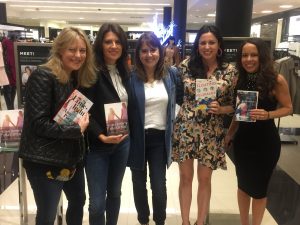Marketing
Photo: Voltamax-60363
I was on the phone with author Barbara Taylor Bradford on Tuesday morning. We were just having a check-in to see how things were going in quarantine. I complained about my mornings of remote learning with my five and eight-year-old children. We both agreed that as women who have worked from home for years—she 40 and me 15—not much had changed for us in that respect. But having lived through WWII, she wanted me to know that it would be OK, that things would get better, that I had to have hope. She then commented that she was excited for the end of the day because after she completed a writing chapter of her next book, she would be shopping online for some Maybelline makeup. This was her reward for a chapter complete. This was the bright little ray on her day.
It made me smile.
In my last WRITER UNBOXED article, I discussed the positive movements in the book world since the pandemic. I’ve seen many a book launch since then, and as a publicist, I’ve been part of a few. Despite all the good, I’ll admit, there are days I feel less than hopeful.
With limited distribution, cancelled tours, fewer marketing dollars, media shifts and downsizes, and possibly decreased publisher support, many authors with books launching this spring are facing a challenge.
So I queried nine authors who have recently launched or are about to launch a new book. I wanted to know, as an artist, what or who gives them hope each day? And what gives them hope for your book despite this uncertain time.
I have to say, the power of US, is so very strong.
Richard Fifield, The Small Crimes of Tiffany Templeton, March 10
My second book was launched on March 7th. Three days later, the world shut down, and I had no live audience, no venues. I need an audience. On the computer, the camera creates a distance that cannot be closed. Last year, my mother died of leukemia, and I was holding her hand at the end, just the two of us, my laptop open, because I promised her that I would finish this book. She was my best friend, and in the last six weeks, I needed her. Our relationship was stormy, until I got sober in April of 2005. I did the work to make it better, and that work began with learning how to love selflessly, to find perspective. Fifteen years ago, I began walking the dogs at Animal Control, the worst dogs, the ones considered unadoptable, damaged beyond repair. I could identify with that. They were so grateful to see me, the real me, and it broke my heart that they had no idea they were set to be euthanized. I was spared, by the grace of something bigger than me, stopped from euthanizing myself slowly. I have adopted five of those dogs, learned to grieve without numbing myself, learned to love without the fear of loss. My rescue dogs rescued me, showed me how to love, and how to be loved. In the last six weeks, they remind me I’m fortunate to have published a book, no […]
Read MoreI promised to follow up my last blog post on searching for relevant grants with a post on how to write a killer proposal. Well, here we are, at my next blog post, but also in another world. One with far more questions than answers–not just about writing, but about basic life and the shape of the future. I have had too much time during shelter in place to think how useless, or even callous it would be for me to carry on as planned. Will there even be grants for writers in the future? Shouldn’t I write a post about how to navigate the now, rather than the not so certain future?
I am not a navel-gazing sort, and my only advice on how to get through the current day-to-day is simply do your best, forgive yourself often and fully, and give yourself permission to pursue what you love and want to do as often as you can. And that last piece of advice is what convinced me to carry on as planned. Because ‘permission’ to do what you love is often linked to having the financial means to do so. Perhaps it’s naïve, but I believe that when we reach the other side of this transformation there will still be opportunities worth pursuing that will require proposals and applications. Perhaps not necessarily just for writing fiction. Perhaps for getting a job. Perhaps for landing a contract. Perhaps for applying for school or education.
Whatever future we are reeling towards, knowing how to describe what you want to do convincingly, concisely, and purposely is useful. Even if you only do it as an exercise to clarify your own understanding of your goals. So here is a strategy for writing an awesome proposal, for whatever you want to pursue.
How to Write a Killer Proposal
At different points in my career some very smart, successful people (including scientists, humanities scholars, writers, and even fitness gurus) have given me advice about how to craft a good project proposal. Despite their drastically different career paths, their advice was surprisingly consistent and could essentially be boiled down to one cardinal rule and four basic pieces of information.
The Cardinal Rule: clarity of language is of more value than trying to write to impress, whether with style, wit, language, name-dropping or jargon. (Although if you can be clear and witty at the same time, then by all means do so.) A good proposal is not about how much you say, but about how well formulated what you say is.
The Four Basic Elements of a Good Proposal. Simply tell them:
It’s so good to be back here on Writer Unboxed after a year’s sabbatical hunkering down and focusing solely on my work helping authors build buzz and visibility at BookSavvy PR. I’ve missed being an active part of this wonderful community (though I’ve still been stalking), and have been bursting with thoughts to share from the frontlines of promotion.
Many of those thoughts suddenly feel less relevant, though, as we all stand paralyzed with shock before the Coronavirus crisis. People across the planet are being forced to adjust in ways we never imagined, and the writing community—despite a penchant for solitude that might suggest we’re relatively “safe”—is no exception. On top of losses ranging from jobs and livelihoods to favorite writing spots in coffee shops and libraries, the cancellation of launch events has come as an especially painful blow. Gratitude to Teri for the initiative to support those whose launches are suddenly un-scheduled.
Yes, it’s an immense disappointment. And yes, it is crushing to imagine not having that well-deserved, long-anticipated celebration and the bond of community it brings. This is a huge, painful loss. But if you are also biting your nails about the impact on your book’s success, my advice from the promo trenches here is: breathe. None of this is as gloomy as it might feel. Need convincing? Here is my reasoning, based on many years on the frontlines:
You Can Reschedule – and There’s a Silver Lining
This is quickly becoming the year of cancellations—and resilience. In the spirit of resilience, the show must go on. Take steps now to reschedule your launch. Your local bookstore may be shut at the moment but you can be in touch with the owner. If they are struggling as sadly, many independent bookstores are right now, and don’t know what the future holds, make a backup plan: a library, or somebody’s home. Invite the bookstore staff and owner too. It might help boost their morale.
And in the meantime, take comfort in knowing that postoning your launch event means you can look forward to it for that much longer, can build buzz in the lead-up to it that much longer, and that you have the support of many amazing communities as Allison Hammer mentioned last week here on WU.
It’s Okay if Your Launch Event and Publication Date Don’t Align
Maybe the idea of rescheduling your launch event worries you because you’ve heard that a launch must happen around the time of publication. Don’t let it. Perhaps because traditional publishers prefer to see as much buzz and as many sales as possible around a publication date, there is a huge amount of pressure on authors to do everything in their power to create that initial bang. But trust me: the bang can happen at other times, too. Books have a long shelf life. (Pun intended) I’ve known and worked with dozens of authors who for various reasons don’t hold a launch event or even begin promotion of any sort until months after a publication date at earliest, and their books have gone on to […]
Read MoreImage – iStockphoto: Valery Ambartsumian
‘The Desire To Change Everything’
In an edition of the interview series First Draft: A Dialogue of Writing excerpted at Literary Hub, the Chilean-American author Isabel Allende says to Mitzi Rapkin, “Literature can maybe change minds, but few people read.
Provocations graphic by Liam Walsh
“Few people allow themselves to be influenced or changed by books,” she says. “It takes a book sometimes decades, sometimes centuries, to have an effect, while journalism is very immediate and very powerful. You have minutes of something on TV, and you can create much more impact than a book can do in many, many years.”
Allende–who has more than 23 books to her name, 74 million copies in 40 languages–is speaking, it turns out, not only as the author we know but as a journalist.
When “the great boom of Latin American literature was a bunch of men” early in her career, she says, she felt she was likelier to be a writer in journalism than in literature.
“I found a job in a feminine, very avant-garde magazine,” she says, “that started to deal with feminism early on when it wasn’t an issue in Chile yet. I had found my perfect niche, and that’s how I began writing. I wasn’t thinking that I was giving a voice to women. It was just random energy and the wish—the desire—to change everything, to change the society, the culture, the religion, everything.”
And it might surprise readers to learn now that she sees books as a slow medium, if you will, by comparison to journalism.
One reason this has resonance today, of course, is that there are so many political books going to market, covering the fray from both sides of a lot of aisles, not just from the classic conservative and liberal stances. Penguin Press’ January 21 release of Philip Rucker and Carol Leonnig’s A Very Stable Genius arrived at No. 1 in new releases at Amazon, not just in politics but overall.
And yet that, of course, is a book by journalists. Rucker and Leonnig are at The Washington Post. And just making such books current by the time they’re out is no walk through the park. Authors talk of adding new last chapters and addenda at the last moment to account for the latest complication (or tweet) in a current-affairs context that just won’t stand still.
One of the most prominent examples of the moment in direct and timely political content is a memoir that’s almost writing the political scene rather than vice-versa. Leaks and passage descriptions from the manuscript of the former White House national security adviser John Bolton’s The Room Where It Happened (Simon & Schuster, coming March 17) are driving much of the discussion around the impeachment proceedings, particularly the question of new witnesses rejected by Senate Republicans for the trial.
Nevertheless, I’m not sure I agree with Allende in her assessment of the relative impact–or the relative speed of impact–of journalism over books, even literature.
And that’s my provocation for you today.
‘The Beginning of Terror’
Among Michael Cunningham’s novels, Read More
For aspiring fiction writers, the typical model of professional practice is to write the whole thing then shop it around, whether to agents, publishers, or directly to readers through self-publishing and self-promotion. Payment (if any) happens long after the work is done. This means not only that income is almost always a gamble, but that critical work time is financially unsupported and often hard to come by. I work as a research administrator for scientists, who also have to do a lot of work before any payoff. The ones I know support their work largely through grants and fellowships. While grants for writers aren’t as numerous (or as lucrative) as grants for scientists, they are out there. This post is a mini-introduction to strategies for finding, selecting, and applying for money to write by. Grants for writing won’t make you rich or give you a cushy life, but they might give you the quiet time you need to finish the critical work.
Types of Funding. There are two basic types of funding available for writers—grants and residential fellowships.
To successfully apply for a grant of any variety requires three steps: A. finding grant opportunities, B. selecting among all those enticing options the opportunities that are worth your time and effort, and C. writing a killer proposal. [This post covers items A. and B.; a later blog will discuss item C.]
A. Finding Grants/Fellowships to Apply For. The internet has made searching for grants easier than ever. You can use google—try typing in ‘best writer’s retreat in x” or “grants for writers with families” and see what shows up. But there are some websites that have done some of your searching for you already. The following is a list of some useful web resources. [Readers–If you’re aware of other resources that should go on this list, please add it to the comments and I will add to this list]
Read MoreThere are plenty of great things about writing and publishing novels. But today, I’m not here to discuss any of them.
No, today it’s time to talk about three of the necessary evils a novelist deals with along the way. While these aren’t the only three tough tasks we have to tackle, they’re the ones I’ve heard writers decry most often as they work on their journey toward publication.
You need to write a query letter (ugh). You need to write a synopsis (ouch). And you need to be able to sum up your entire novel in one simple sentence (how?!).
So since each of these is a necessary evil, I thought I’d address a) just how necessary and b) just how evil each one is for the average writer. Let’s begin!
The Query Letter. How necessary? 9 out of 10 if you’re seeking traditional publishing; if you’re going the indie route, make that a 0 of 10. How evil? Mmm, let’s say 7 or 8 out of 10 for most of us.
Look, query letters are tough. But the job of the query letter isn’t to describe your entire novel. It’s just to whet the appetite of the agent to ask for more. If you can frame out what makes your novel especially intriguing, include any special credentials that show why you’re the right person to write it, and leave the agent wanting more, you’ve pretty much got it covered. Easier said than done? Absolutely. A necessary part of the process for hooking an agent? Pretty much totally, unless you happen to hook someone in a pitch session at a conference, and even then, you’ll probably want some kind of query/cover letter to re-introduce yourself when you send your materials along.
The Synopsis. How necessary? Maybe 7 out of 10. How evil? Yeah, that’s a 10. It’s the most.
Read More



















